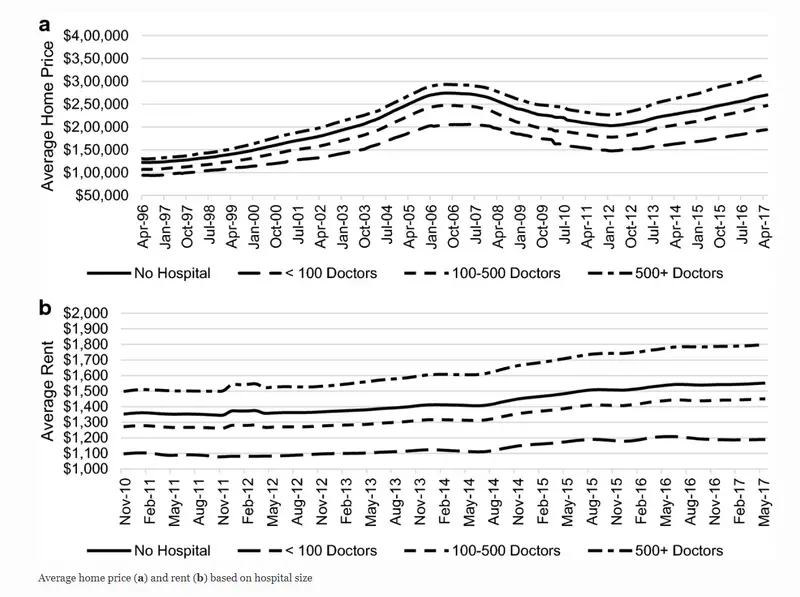
If you’ve been to see a property on your search for a new home and you discover it’s near a hospital., is this a good or a bad thing and should you buy it? There are a number of pros and cons of living near a hospital, which is why it’s important to consider carefully before you buy a house near a hospital.
Is it good to buy property near a hospital?
Properties near hospitals are a good buy as they are always in high demand for doctors, nurses and ancillary staff who work at the hospital to either rent or buy. Property values near hospitals are always higher than in areas with no hospital due to demand, especially if it’s a large hospital.
Before you leave, you may also like to discover how you could save you up to £71,475 when you buy your next house if it would originally cost £350,000. Alternatively, if you propose to buy your next house for £250,000, the saving could be up to £51,852 instead.
To find out more, plus to get hold of my free mortgage savings calculator tool, please take a look at my video course about how to sell your house in under 2 weeks for more money.

Does a hospital nearby increase property value?
Having a hospital nearby does increase property values, especially if it is a high-ranking hospital large hospital. For example, homes near hospitals with 500+ doctors in 2016 were worth on average $50,000 more.
As can be seen from the graph above from a study of US homes, the average price of homes and rents near larger hospitals is higher than areas with no hospital. It’s interesting to note that homes near hospitals with less than 500 doctors, the homes are worth less than areas with no hospitals at all.
Having said that, according to Realtor.com, homeowners who sold in 2015 near a hospital generally got 3% less than an average home in the same county would get, based on their sales deed records and hospital location data from data.medical.gov.
Pros and cons of living near a hospital
As with anything, there are always pros and cons to consider. As far as buying a house near a hospital the pros and cons include.
What are the advantages to living near a hospital?
- Property near hospitals tend to be worth more than similar properties further away due to demand by doctors, nurses and property investors looking to let property to hospital staff.
- Great if you work at the hospital for getting to work quickly.
- Good if you need to visit the hospital for an emergency or for regular check-ups, especially if you don’t drive.
- Homes near hospitals are less likely to have electricity outages or rolling blackouts, as hospitals are exempted from excessive load shedding practices where the power can be turned off.
- Good for the elderly if you need to visit the hospital regularly and can walk.
- If there’s a power outage due to storm damage, houses near hospitals benefit from having the power restored as a priority for the hospital.
- In the winter the roads and streets near hospitals will be the first to be cleared of snow and will always be gritted.
- The infrastructure near hospitals is normally to a high standard.
- Transport links like busses are often good near hospitals.
What are the disadvantages to living near a hospital?
- Parking may be a problem on the streets near a hospital, as there’s not always enough parking for staff and patients at the hospital itself and it can be expensive to park there (okay if the house has off-road parking).
- If the hospital has an Emergency and Accident or A&E (or ER) department you may be disturb by the sirens from ambulances – this will be 24/7, but ambulance drives will turn-off the siren close to a hospital to avoid disturbing patients in the hospital and nearby residents.
- You may be disturbed by helicopters bringing in emergencies if the hospital has this facility.
- Property will normally be more expensive.
- There may be a lot of buy-to-let houses in the neighbourhood with tenants.
- Hospitals tend to be built near main roads, so you may have other traffic noise too.
- If you work from home the noise from sirens may interrupt phone calls and video-conference meetings.
- Houses near hospitals tend to be more expensive so may be more difficult for first time buyers to afford.
Is it bad to live near a hospital?
The only bad points about living near a hospital is if it has an A&E department so there will be noisy ambulances departing and arriving 24/7 and parking in the streets can be problematic, unless there are resident parking permits in use.
Is it noisy living next to a hospital?
It can be noisy living next to a hospital, particularly from the noise of ambulance sirens if it has an A&E (ER) department, which can be at any time of the day and night. An ambulance siren is between 120-130 decibels, which is the same level as a jet plane taking off from an airport.
Are houses near hospitals cheaper?
Houses near hospitals are not cheaper than similar houses further away. This is because hospitals have a large number of staff which creates demand for houses near the hospital from doctors and nurses who prefer to live nearby.
Why is it important to live near a hospital?
It could be argued it is important to live near a hospital if you work there as a doctor or nurse and if you need to get there quickly for an important operation. Also, if you need to visit the hospital on a regular basis and you cannot drive, living nearby would also be important.
Is it safe to live near a hospital?
It is generally safe to live near a hospital, as hospitals attract doctors and other high earning professionals to live nearby, so they make good neighbours.
What to check before buying a house near a hospital
Before you buy a house near a hospital, check the following things first:
- Do you research into sold comparables to make sure you are paying the right price for the house.
- Check if the house has double glazing, as this will help in the night with the noise of ambulance sirens.
- If you are concerned about noise and traffic, speak with other homeowners in the neighbourhood.
- Visit the house on more than one occasion both to view the inside and to experience the outside and noise levels by taking a walk in the area.
Final thoughts on buying a house near a hospital
If you have done your checks into the area and if the hospital isn’t in plain sight, as hospitals are generally not the best looking buildings, there’s no reason not to buy a house near a hospital. Houses near hospitals will always be in demand, so will tend to be worth more than similar houses further away from the hospital.
An important read before you go
Finally, you may also like to discover how you could save you up to £71,475 when you buy your next house if it would originally cost £350,000. Alternatively, if you propose to buy your next house for £250,000, the saving could be up to £51,852 instead.
To find out more, plus to get hold of my free mortgage savings calculator tool, please take a look at my video course about how to sell your house in under 2 weeks for more money.
I hope you’ve enjoyed this article about buying a house near a hospital
If you’ve enjoyed this article about “buying a house near a hospital” please share it on your favourite social media site.
Also, if you have any questions, please feel free to comment below too. Please also share any of your experiences with properties you’ve bought. Alternatively, if you need more help, please feel free to contact us on our contact us page here. Or join the discussion and ask your question in the property forum.




